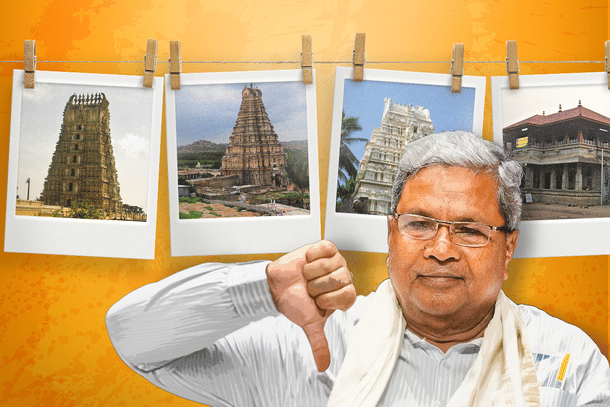Karnataka
Karnataka Temples Need To Cough Up Taxes To 'Common Pool Fund' — Here's What It Means
Swarajya Staff
Feb 22, 2024, 08:48 AM | Updated 08:48 AM IST
Save & read from anywhere!
Bookmark stories for easy access on any device or the Swarajya app.


On January 21, Wednesday, the Karnataka state assembly passed amendments to the Hindu Religious Endowments Act. The amendments to the bill have sparked controversy and drawn criticism from various quarters.
Under the newly introduced provisions —
a. Temples with an annual income exceeding one crore rupees are required to contribute 10 per cent of their earnings to a 'Common Pool Fund' (CPF).
b. Similarly, temples earning between Rs.10 lakh and rupees one crore annually are mandated to contribute 5 per cent of their income to the same fund.
The opposition Bharatiya Janata Party (BJP) was quick to criticise the amendments and termed it 'anti-Hindu'. Users on 'X' have hit out at the Government of Karnataka, calling it a 'legal way to loot the temples' and that the decision was almost expected from the Congress party.
As outlined in Section 19(a), the funds collected in the CPF can be utilised for the benefit of the "poor and needy organisations", which is not a clear definition of what exactly it constitutes. Critics argue that this vague terminology opens the door to potential misuse of temple funds, diverting them away from their intended religious and community purposes.
Another controversial provision, detailed in Section 25, allows for the appointment of members from both Hindu and other religious communities to the management committee of composite institutions.
This move has been labelled as an infringement on the autonomy and traditional management structures of Hindu temples.
Opponents of these amendments have voiced strong objections, characterising them as 'anti-Hindu' measures aimed at siphoning temple funds and redistributing them to other religious institutions. They argue that such actions undermine the autonomy and integrity of Hindu religious institutions, raising concerns about the equitable allocation and management of temple resources.
The amendments have sparked a heated debate within the state. While proponents argue that the amendments promote inclusivity and equitable distribution of resources, critics remain steadfast in their opposition, viewing the provisions as a threat to the sanctity and independence of Hindu temples.
Vijayendra Yediyurappa, the president of the Karnataka unit of the Bharatiya Janata Party (BJP), took to social media platform X to criticize the Congress government's motives behind the recent bill.
He alleged that the government's intention behind the bill was to replenish its depleted finances by targeting Hindu temples. He questioned the selective approach of the state government in collecting revenue, emphasizing the absence of similar measures targeting the finances of other religious structures.





